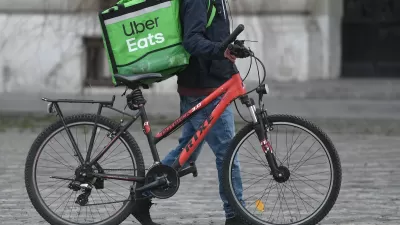While cities in the developing world embrace the chaos and risk inherent in their informal landscapes, the Western world excels at regulation. But this dynamic is starting to change, to the dismay of incumbent industries and establishment regulators.
Over the last two decades, the social web has helped facilitate the "de-formalization of every sector of the economy and society [in the developed world], from transportation, to wellness and healthcare, to travel, to journalism, to humanitarian aid, and on and on and on," argues Nick Grossman, “Activist in Residence” at Union Square Ventures and a Visiting Scholar at the Center for Civic Media at the MIT Media Lab. "In effect, [these platforms] are applying highly formal structures to these 'informal' personal interactions, bridging the gap between the industrial economy and the informal economy."
"Not surprisingly, we’re seeing this conflict unfold as the new informal economy, operating at web scale, draws the ire of both incumbent industries and establishment regulators whose livelihoods it threatens," he explains. "Sharing rides is illegal. Sharing apartments is illegal. Making person-to-person loans is illegal. Even free online education is illegal. For now."
One might draw parallels with the tactical urbanism movement, and the pushback from local authorities that several projects have received.
"Slowly but surely, however, jurisdictions are adapting their regulatory positions to recognize and support the new informal economy, powered by the tools of the social web, and recognizing some of the legal precedents that have allowed the web to thrive," Grossman adds. "The challenge will be to continue pursuing the goals of safety, accountability and equity, while simultaneously embracing this return to the informal."
FULL STORY: How the Social Web is Helping the West Rediscover Its Informal Side

Planetizen Federal Action Tracker
A weekly monitor of how Trump’s orders and actions are impacting planners and planning in America.

Map: Where Senate Republicans Want to Sell Your Public Lands
For public land advocates, the Senate Republicans’ proposal to sell millions of acres of public land in the West is “the biggest fight of their careers.”

Restaurant Patios Were a Pandemic Win — Why Were They so Hard to Keep?
Social distancing requirements and changes in travel patterns prompted cities to pilot new uses for street and sidewalk space. Then it got complicated.

Platform Pilsner: Vancouver Transit Agency Releases... a Beer?
TransLink will receive a portion of every sale of the four-pack.

Toronto Weighs Cheaper Transit, Parking Hikes for Major Events
Special event rates would take effect during large festivals, sports games and concerts to ‘discourage driving, manage congestion and free up space for transit.”

Berlin to Consider Car-Free Zone Larger Than Manhattan
The area bound by the 22-mile Ringbahn would still allow 12 uses of a private automobile per year per person, and several other exemptions.
Urban Design for Planners 1: Software Tools
This six-course series explores essential urban design concepts using open source software and equips planners with the tools they need to participate fully in the urban design process.
Planning for Universal Design
Learn the tools for implementing Universal Design in planning regulations.
Heyer Gruel & Associates PA
JM Goldson LLC
Custer County Colorado
City of Camden Redevelopment Agency
City of Astoria
Transportation Research & Education Center (TREC) at Portland State University
Camden Redevelopment Agency
City of Claremont
Municipality of Princeton (NJ)





























